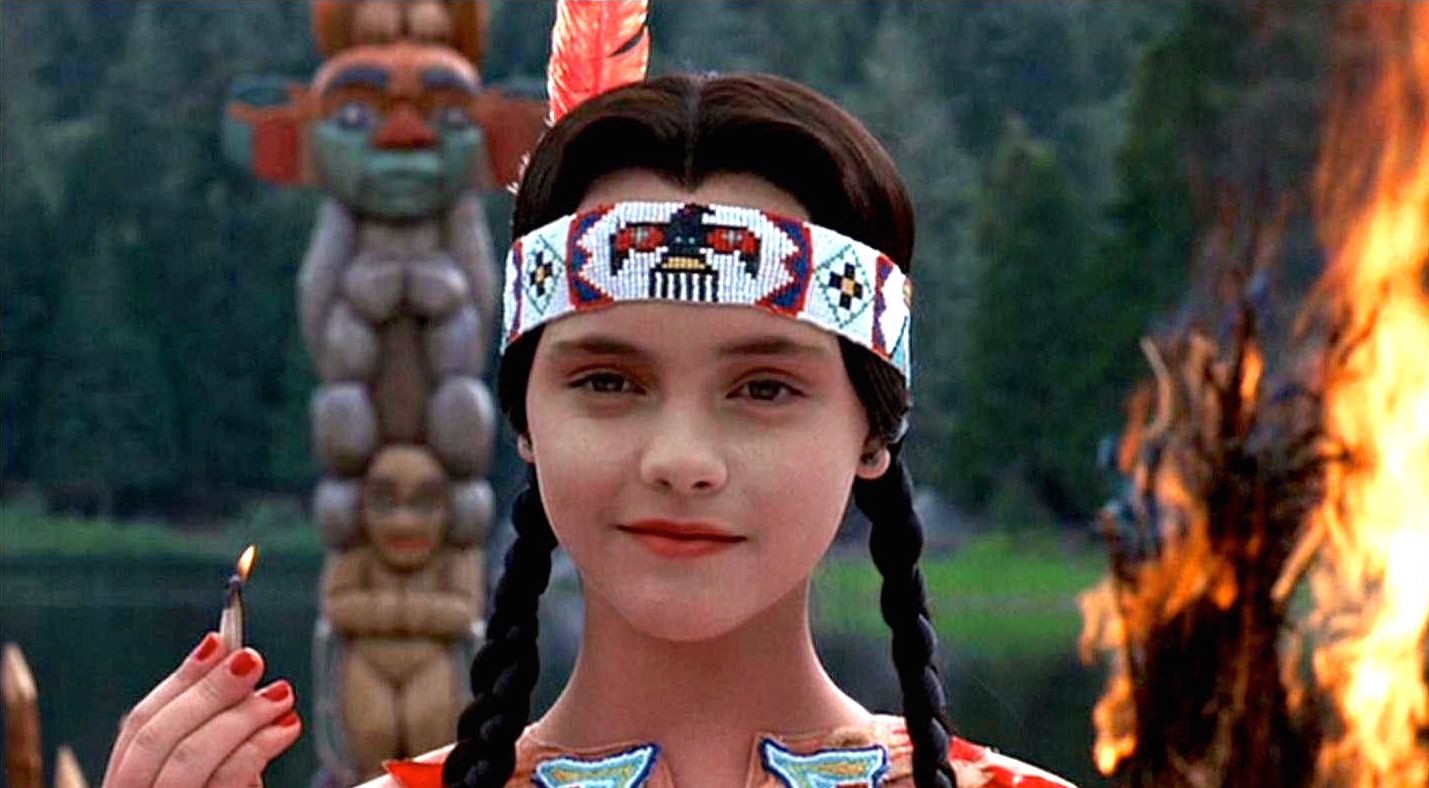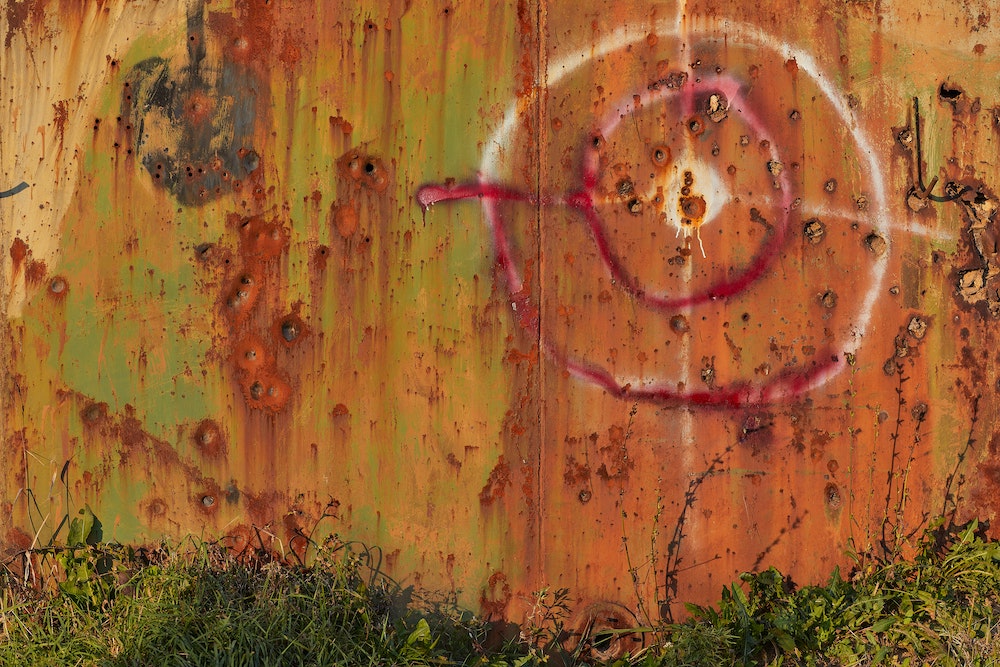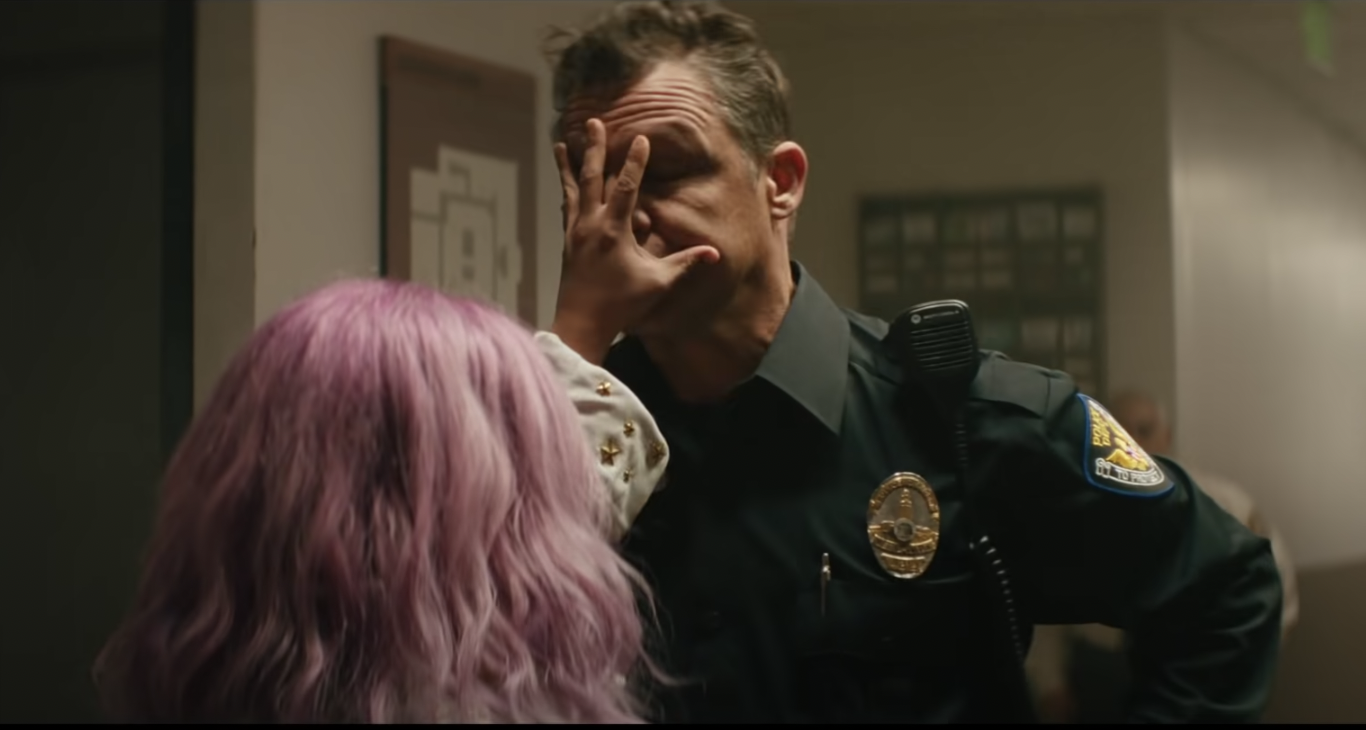Books & Culture
Wednesday Addams is Just Another Settler
Learning to be less isolated on a holiday I can’t trust

Thanksgiving is upon us, so it’s time for the internet to celebrate that video clip of Wednesday Addams in a beaded headband. “How! I am Pocahontas, a Chippewa maiden,” she says through a forced smile in the 1993 film Addams Family Values. Wednesday (Christina Ricci), my goth ancestor, has been sentenced to a summer of wholesome outdoors activity at Camp Chippewa, but she reviles the camp and its sun-soaked golden children. As a self-defined outcast and hater of fun, she chooses the camp’s pageant as the site of her rebellion, going off script with a monologue:
You have taken the land which is rightfully ours. Years from now, my people will be forced to live in mobile homes on reservations. Your people will wear cardigans and drink highballs. We will sell our bracelets by the roadsides. You will play golf and enjoy hot hors d’oeuvres. My people will have pain and degradation. Your people will have stick shifts. The gods of my tribe have spoken. They have said, “Do not trust the pilgrims, especially Sarah Miller.”
This clip’s Facebook rounds used to be one of the things I liked about Thanksgiving. I, too, am the “little brunette outcast,” knife-eyed and long-haired, seen only in dresses black as bat wings even through summer. I, like Wednesday, do not trust the Pilgrims. Smug in my embrace of the macabre and hoping to grow up to be Morticia, I paint my lips red as a guillotine’s blade. I’m the kind of girl who flirts by asking, as Wednesday says to her love interest while they stare across a skeleton’s ribcage, “Do you believe in the existence of evil?”
But Wednesday Addams is a settler. I can only trust her if she gives me reason to. This year, I will not celebrate her monologue.
In Addams Family Values, loving parents Morticia and Gomez send Wednesday and her brother Pugsley away to summer camp at the recommendation of the homicidal nanny, who seeks to shuttle off the precocious children to a place where they won’t interfere with her plot to marry and kill Uncle Fester. The camp scenes were filmed in California, far from the New Jersey lake community where I grew up, but the locations look alike. Though at my lake, there was nothing like Camp Chippewa, “America’s foremost facility for privileged young adults.” There was a cluster of mobile homes by the shore, across the road from the swamp. There was a restaurant (now vacant), a bar (collapsed, I think), and a general store (bulldozed).
Wednesday Addams is a settler. I can only trust her if she gives me reason to.
The location of the Addams family’s mansion isn’t specified in the film, but in creating the original cartoons, Charles Addams drew inspiration from his hometown of Westfield, an hour’s drive from my lake. The television series places the mansion adjacent to a cemetery and a swamp. Near my parents’ house, the swamp is supposedly full of ghosts, but I wouldn’t know, because it’s also full of bears and West Nile virus-carrying mosquitos. Far beneath the winding road lined with houses that belonged to the city businesspeople who brought their white vinyl siding into our woods, the swamp always seemed to be the last place colonization hadn’t reached.
Last November at Standing Rock, four days before Thanksgiving, South Dakota law enforcement attacked water protectors with rubber bullets, tear gas, concussion grenades, and high-velocity blasts from water cannons and streams from hoses. The temperature was in the 20s; seventeen people were taken to the hospital for hypothermia treatment. A non-Native woman was hit by a concussion grenade that night. It nearly blew off her arm. She didn’t lose her limb, but the hand still has no feeling.
About a month earlier, Hillary Clinton’s director of coalitions press Xochitl Hinojosa released a statement:
We received a letter today from representatives of the tribes protesting the construction of the Dakota Access Pipeline. From the beginning of this campaign, Secretary Clinton has been clear that she thinks all voices should be heard and all views considered in federal infrastructure projects. Now, all of the parties involved — including the federal government, the pipeline company and contractors, the state of North Dakota, and the tribes — need to find a path forward that serves the broadest public interest. As that happens, it’s important that on the ground in North Dakota, everyone respects demonstrators’ rights to protest peacefully, and workers’ rights to do their jobs safely.
I declined Thanksgiving invitations so I could spend the day alone in avoidance of football, gluten, and turkey smells that cling to my long hair, instead refreshing Facebook for updates from my friends who had traveled to Standing Rock for the long weekend. How do I talk to my family about politics at Thanksgiving? the internet kept asking itself. While militarized police kept their guns pointed at people without weapons, Hillary Clinton tweeted, “Hoping everyone has a safe & Happy Thanksgiving today, & quality time with family & friends,” and I spoke to no one. I was like Wednesday, refusing to be hugged. It didn’t feel right, but it felt safe enough.
It’s been a decade since I spent a Thanksgiving with my parents. After I moved to the West Coast, the holiday wasn’t important enough to me to justify the expense of a cross-country flight. For the last ten years, I’ve spent Thanksgiving with friends or relatives or alone. I’ve never liked Thanksgiving and for a while, I couldn’t figure out why: I like and love my family and I like to eat. I decided it was the football, or the years of packing my body with stuffing while suffering from undiagnosed celiac disease, or the anxiety, later, of trying to avoid both gluten and the anxious shame of making others think about it. Really, though, I’m uncomfortable committing to a six-hour stretch spent with other people (even those I’m fond of), no activity planned but eating, no hiding place for me to retreat to, and no way to silence the mean critic in my head who begins analyzing my words at the two-hour mark. I dread any event that fits this description. Thanksgiving is only different because my Nativeness has let me get away with hating it.
I dread any event that fits this description. Thanksgiving is only different because my Nativeness has let me get away with hating it.
When Wednesday and Pugsley arrive at Camp Chippewa, directors Gary and Becky introduce themselves to the campers and their families. “We’re all here to learn, to grow, and to just plain have fun,” Becky says. “Because that’s what being privileged is all about!” Gary adds. Everyone applauds but Wednesday, who drinks from a bottle of poison.
Later, the children receive bows and arrows, line up, and take turns at the target. Pugsley aims at the sky. A bird falls dead to the ground. “It’s an American bald eagle,” Becky laments. “But aren’t they extinct?” Gary asks. Wednesday says, “They are now.”
Addams Family Values opens with Fester howling lonesome at the moon and ends with Wednesday telling her love interest, “If I wanted to kill my husband, I’d do it, and I wouldn’t get caught.” He wants to know how. “I’d scare him to death,” she says.
I am neither Wednesday nor Fester. I am not the grim girl with her own guillotine, not the unsmiling camper who would let the blonde girl drown. Neither am I the old ghoul who wants a companion so badly he clings to the woman who tries to electrocute him in the bath. But I am a loner and a weirdo. Even in our kindergarten Thanksgiving celebration, for which I was assigned a construction paper feathered headband that signified my affiliation with the half of the class playing the Indians, I didn’t belong, because I was going to be Native the next day, too, and every one after, while they were going to forget we’d even played this game.
On Facebook, a few days after last Thanksgiving, Alicia Smith wrote,
White people are colonizing the camps. I mean that seriously. Plymouth rock seriously. They are coming in, taking food, clothing and occupying space without any desire to participate in camp maintenance and without respect of tribal protocols.
These people are treating it like it is Burning Man or The Rainbow Gathering and I even witnessed several wandering in and out of camps comparing it to those festivals.
Two months earlier, Jen Deerinwater wrote, “We need allies, not patronizing people with a God complex who drown out our voices by further colonizing our spaces.”
White friends texted me questions about Standing Rock, and I Googled the answers that hoped would make up for the fact that when they asked me whether I was going there, I had to say that I wasn’t. I had a job and too many PTSD triggers, like cops and shouting. “I can’t,” I kept saying, by which I meant that I wouldn’t, because my own needs lived in my body, and everyone else’s were on the other side of some moat I chose not to cross.
At the end of Wednesday’s Thanksgiving speech, she says, “I have decided to scalp you and burn your village to the ground.” Her fellow misfits proceed with the latter. They torch the set and rope the blonde nemesis to a stake at which she’ll be burned. Wednesday, smug as a pardoned turkey, strikes a match.
I didn’t belong, because I was going to be Native the next day, too, and every one after.
After the pageant, having proven themselves the outcasts, through with their revenge and accountable to no one and no place, Wednesday and Pugsley go home. The buildings are still on fire, but someone else will watch them burn.
When I graduated from the University of Washington in 2009, I was invited to Raven’s Feast, an annual salmon dinner honoring all Native graduates. Not wanting to take up space at one of the banquet tables, I stood by the doors and ate salmon and cake from a precarious paper plate while faculty members called the graduates’ names. At the mic, I couldn’t find the words of gratitude the other students so easily expressed. I was grateful to my family, but I hadn’t thought to invite them.
The next year, by then a university office assistant, I went to Raven’s Feast to help. I liked being at the edge of the room, quiet in my apron, taking direction on how much wild rice to scoop onto plates. I stayed on to work for the university through seven more Raven’s Feasts. My colleagues and I made massive Costco runs and triple-checked sheet cake specs. We assembled massive bowls of salad. We smiled at graduates and their families while making sure everyone’s serving of salad had at least one cherry tomato. Over time, returning to the same tasks, I saw myself changing. I wanted to help and I wanted to belong. I was growing out of isolation.
Non-Native people have asked me, How many gods do you believe in? None, exactly. I believe in as many spirits as there are animate and inanimate beings. There are no gods to tell me who to trust, only people who tell me how to stop hiding in dread and how to stay close to the other beings who will protect me from evil.
There are no gods to tell me who to trust, only people who tell me how to stop hiding in dread.
As I stepped into the kitchen during my final Raven’s Feast, a colleague handed me a small, burning hot piece of salmon belly, straight from the fire. The belly is my favorite part. The salmon promised my ancestors that we could count on their sustenance. Every spring, my tribe holds its First Salmon Ceremony to show reverence to the salmon that have agreed to feed us. Each of us takes a small piece of cooked flesh and gives thanks for it.
After my last Raven’s Feast, I went home and wept. In a room of hundreds of Native students and relatives, I’d felt at ease, and I wanted to belong there forever. I cried into hands that smelled like salmon, even though I thought I was alone.
This Thanksgiving, Ivanka Trump suggests we solve the problem of Thanksgiving table decorations by filling an oversized clamshell with small pumpkins, pinecones, and brambles. Daniel Kibblesmith tweets, “FILL A GIANT CLAM WITH GARBAGE FROM THE WOODS YOU ARE THE GARBAGE GOD NOW.” This Thanksgiving, having moved a day’s drive from the lake, I will be with my parents and my grandma. No one will enforce festivity through the use of an overwrought centerpiece. We will eat my favorite dessert salad and tell each other the stories of our lives: theirs before I was born, everyone’s in the months we’ve been apart. That is the belonging I want. The gods of my tribe, if that’s what they are, have spoken since the beginning of time. I don’t know what they said but I do not believe they wanted us to be alone. I’m trying.








